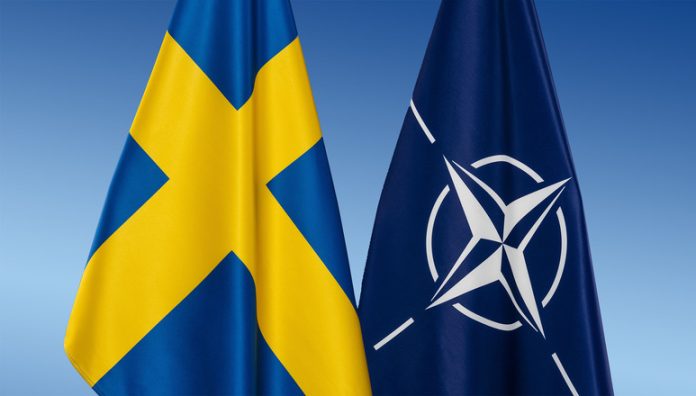Sweden completed the necessary diplomatic formalities on March 7, depositing its instrument of accession with the U.S. State Department in Washington, which manages the official depository vault for NATO documents. In this case, Swedish Prime Minister Ulf Kristersson hand-carried his country’s accession documents to the State Department for presentation to Secretary of State Antony Blinken, and with that final step Sweden became the 32nd member of the NATO alliance, nearly a year after Finland joined in April 2023.
Secretary Blinken said the accession documents he was receiving were the product of “nearly two years of tireless diplomacy” by NATO members.
Sweden’s formal NATO accession ceremony was held at NATO Headquarters in Brussels on March 11. From that point on all official NATO ceremonies now require that all 32 NATO members’ flags are raised.
Sweden is now a NATO member. Thank you all Allies for welcoming us as the 32nd member. We will strive for unity, solidarity and burden-sharing, and will fully adhere to the Washington Treaty values: freedom, democracy, individual liberty and the rule of law. Stronger together.
— SwedishPM (@SwedishPM) March 7, 2024
A long and tortured road to accession
Stockholm announced that Sweden would apply for NATO membership on May 16, 2022, in coordination with neighboring Finland’s application to join. Russia’s February 2022 invasion of Ukraine was indisputably the primary driver for both formerly neutral countries to swiftly change policy, but for both Nordic countries, cooperation with NATO had been a slow but steady ongoing process.
Before 2022, Sweden had maintained its formal policy of neutrality which had been loosely in place since the Napoleonic wars, at the end of which Sweden was forced to make major territorial concessions, including ceding Finland to Czarist Russia.
Something less than neutral
At the end of the Cold War, two things projected a tint of gray onto Sweden’s official policy of neutrality. First, Sweden joined NATO’s Partnership for Peace (PfP) scheme in May 1994, allowing some military interaction and coordination between the parties, but no actual discussion of potential accession. When Sweden entered the European Union in 1995, it obligatorily signed up to follow the EU’s Common Foreign and Security Policy (CFSP), which removed all but the actual label of neutrality but did not insert Sweden formally into any new NATO mechanisms.
However, in these years Sweden participated in a wide range of multilateral peacekeeping operations bringing it into close operational cooperation with NATO. Sweden later signed a host country agreement with NATO (agreed in 2014 and ratified in 2016), allowing NATO forces to conduct joint training exercises on Swedish soil and specifically allowing NATO member states’ forces to be deployed in Sweden in response to threats to Sweden’s national security, provoking Russian anger and even threats.
While Finland’s NATO accession bid moved ahead rather smoothly in 2022-23, Sweden faced a series of objections from both Moscow-friendly and marginally democratic NATO members Turkey and Hungary, with Turkey pumping out the largest number of objections to Sweden’s entry.

The accession timeline began with the invitation of Finland and Sweden to become members at the Madrid NATO summit on June 29, 2022. Member negotiations were held on July 4, and the accession protocols were signed at NATO Headquarters in Brussels on July 5. The same day, Canada made history by becoming the first country to ratify both countries’ applications.
Holding out for something better
By October 2022, all NATO members except for Turkey and Hungary had completed the processes for ratifying Sweden’s accession.
Turkey argued from the start that Sweden had long been coddling Kurdish separatist “terrorists” (many were refugees) and that Islamophobia (e.g., Quran burnings) had spread freely in the country’s free and open political environment.
With a lot of help from Washington and others, most of these concerns were resolved through a protracted set of compromises. We will probably never see a full account of the number and scope of high level meetings and interventions required to deal with Turkey’s constantly shifting demands for Swedish, EU and U.S. concessions. In the end, Sweden undertook concrete steps to toughen its anti-terror legislation to manage specific Turkish concerns.
All involved knew, however, that these issues were in effect an extensive sideshow.
The ultimate “Turkish bazaar” determining the accession outcome was actually about whether Turkey could receive Washington’s approval for Ankara’s plans to upgrade its rapidly ageing F-16 fighter fleet, which most military analysts agreed was needed to shore up NATO’s southern flank. The actual problem however flowed from Ankara’s insistence on using its fighter aircraft assets to challenge Greek sovereignty/boundaries around the Aegean Sea, a seemingly never-ending dispute that neither Washington nor NATO had ever managed to resolve.
The Hellenic lobby in the U.S. and many cool-headed congressional representatives worked to freeze the proposed F-16 deal and failing that, demanded concrete assurances from the Biden administration that NATO allies Greece and Turkey would not see the situation over the Aegean further deteriorate if Turkey actually got the fighter upgrades which were intended to strengthen its air defenses against non-NATO (Russia or Iran) countries. It should be recalled Turkey had previously been sanctioned by the Trump administration for procuring Russian built S-400 air defense missiles in defiance of NATO, and working around those restrictions remains a challenge.
For all of this to play out, extensive diplomacy was needed, often with Washington in the lead role. Finally, in late 2023 Ankara toned down a range of military activities which Greece and its many congressional supporters saw as provocative, while also dialing back some other activities in the region that Washington considered problematic. Accordingly, the F-16 upgrade sale to Turkey was approved and in a series of well-orchestrated moves, specific assurances, mostly in letter form, were sent to Congress.
This step, in turn “motivated” Turkey’s President Recep Tayyip Erdogan to order up the necessary parliamentary ratification of Sweden’s accession to NATO in January, the last major impediment. This action also earned him a White House invitation to meet President Biden in May, Turkish media sources hint.
Hungary, still lingering in the shadows and hoping to generate political pain for its Eurocrat critics but not specifically Washington, finally pressed its parliament into action, which ultimately ratified Sweden’s NATO accession on February 26, days after a high-level Swedish visit where an important arms deal was signed.
Earlier today, I was with @SwedishPM Kristersson as Sweden officially joined @NATO. Tonight at #SOTU, @POTUS welcomed Sweden to the strongest military alliance the world has ever known.
— Secretary Antony Blinken (@SecBlinken) March 8, 2024
Where do we go from here?
NATO’s next annual summit will be held in July in Washington, DC, and this summit will mark the alliance’s 75th anniversary. The appropriate celebrations will be held marking NATO’s longevity, recent expansion and most definitely, discussions about further alliance expansion will be center stage.
Summits require “deliverables” to use a bit of Washington-speak. It is fair to say that everyone wants to know what outcome to expect……will Ukraine be invited to join NATO at this summit? And if so, how long of an actual accession process should be expected?
For Kyiv, of course the answer is urgent if not existential; for the rest of NATO, not so much.
Coming in a U.S. election year when much of the steady flow of military support from allies has become questionable, handling of the Ukraine arms resupply issue will be critical. Will frozen Russian assets held by the west be repurposed to take up the slack? A number of good ideas are on the table to provide resupply relief. If so, and appropriately giftwrapped, this could be one practical and realistic deliverable for Kyiv if it is decided that no formal membership application is immediately forthcoming.
Finally, how will NATO manage the French drive within the EU, not universally supported, to develop additional EU military autonomy and to finance the European defense sector?








